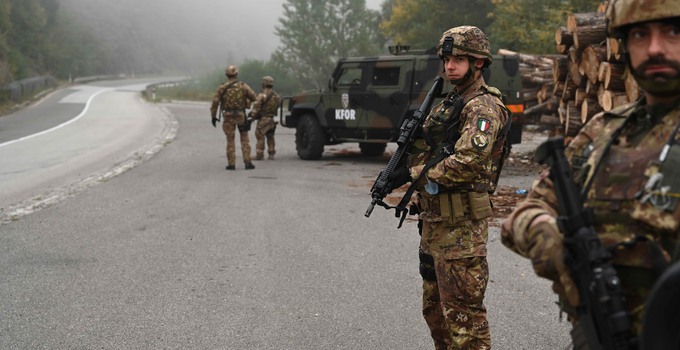
Foto:Nato
Focus on external actors' military strategies
To understand how military interventions affect the dynamics of civil war, intervention strategy needs to be studied in particular, according to a new thesis from the Swedish Defence University.
Nowadays, foreign troops are actively involved in almost half of all civil wars. But research often misses the strategic dimension, according to Emil Grünberg Petersson.
"You often have a fairly simple linear view of the relationship between intervention and its effect on a civil war. I want to highlight and increase the understanding of how an intervention actually leads to an outcome," says Emil Grünberg Petersson.
Wants to nuance the picture
In his dissertation Strategy of Intervention: The Dynamics of External Use of Force in Civil War , he analyzes three different cases: NATO's intervention in Libya during the civil war in 2011, Russia's invasion of Georgian South Ossetia in 2008, and the NATO countries' intervention in the Kosovo war in the nineties.
"If you lift the lid and start unravelling the processes, you see that a lot happens before there is a political outcome," says Emil Grünberg Petersson.
With regard to Russia's invasion of Georgia, it may seem strange that a country as small as Georgia wanted to risk becoming armed with Russia, as happened when the Georgian government escalated its attempts to reintegrate South Ossetia in 2008.
"What I conclude is that Georgia had a fully legitimate reason for wanting to reintegrate the area. But I also believe that they had a realistic strategy. Then they misjudged the extent to which Russia was prepared to enter directly into a neighboring country.
In the case of Kosovo, Emil Grünberg Petersson has developed a framework for classifying intervention strategies. Academically, there is disagreement about what strategy the UN used to try to force the Yugoslav government out, he says. Was it punishment, or was it an attempt to deny the Yugoslav Government the opportunity to win on the battlefield in Kosovo?
"I conclude that all the previously set labels are correct, but they were done in parallel or in sequence with each other. To say that there was a single strategy is too simple," says Emil Grünberg Petersson.
Created new dataset
Emil Grünberg Petersson has a background in peace and conflict studies. He believes it is useful to let different research fields take in theoretical perspectives from each other.
"There is a lot to gain from incorporating strategy studies into peace and conflict studies, not least when it comes to unobserved causal mechanisms – assuming that something is happening, without studying it further.
For the thesis, Emil Grünberg Petersson has created a completely new dataset to be able to answer how NATO's air operation affected the Libyan actors' ability to take and hold territory. The study of armed conflicts can be limited by using existing databases, he believes. In the past, it has mostly been assumed that the intervention contributed to Gaddafi's loss.
"Some assumptions were correct, others not to the same extent, and some dimensions have not been sufficiently highlighted before," says Emil Grünberg Petersson.
In all the interventions he has examined, an external actor has provided direct or indirect support to rebels.
"It is likely that the rebels will win if they receive external support. But there are variations in how effective the support is. And it matters a lot how the government that is targeted chooses to act.
Publication
Emil Grünberg Petersson (2024): Strategy of Intervention: The Dynamics of External Use of Force in Civil War.
Emil Grünberg Petersson defended his PhD in War Studies at the Swedish Defence University on 25 October 2024.
Page information
- Published:
- 2024-10-27
- Last updated:
- 2024-10-27
